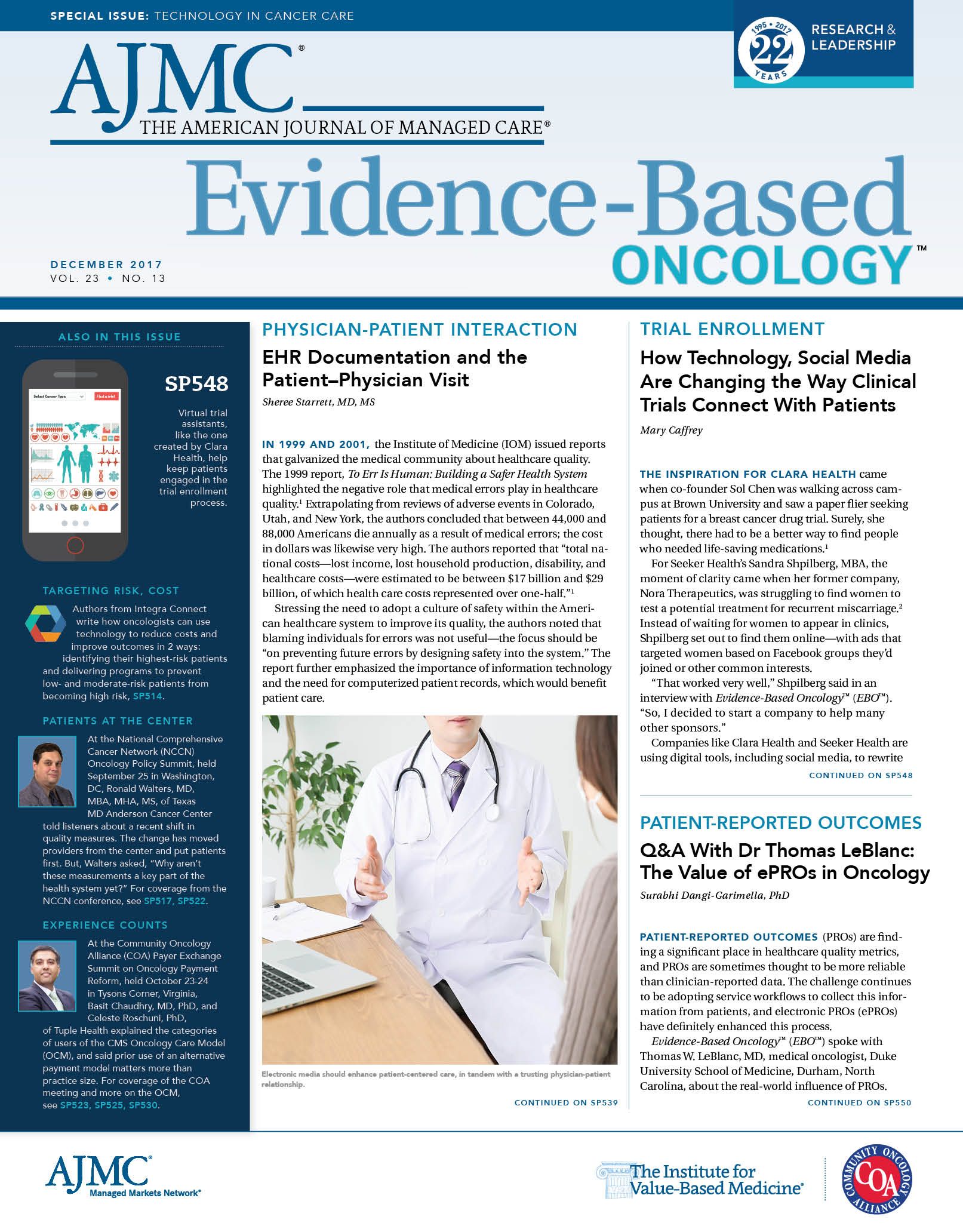- Center on Health Equity & Access
- Clinical
- Health Care Cost
- Health Care Delivery
- Insurance
- Policy
- Technology
- Value-Based Care
Stakeholders Weigh in on Payment Reform in Cancer Care
Coverage from the Community Oncology Alliance Payer Exchange Summit on Oncology Payment Reform, held October 23-24 in Tysons Corner, Virginia.
WHEN THE ONCOLOGY CARE MODEL (OCM) program was announced by CMS in early 2016, 196 practices and 17 payers signed on to participate for its 5-year duration. Per the CMS website,1 the numbers now stand at 190 and 14, respectively. Tuple Health, a healthcare technology start-up, interviewed some of the stakeholders participating in value-based care delivery and the OCM to gain their perspectives of the state of cancer care and healthcare reform. The results were presented Basit Chaudhry, MD, PhD, co-founder and CEO of Tuple Health, and Celeste Roschuni, PhD, user researcher, Tuple Health, at the Community Oncology Alliance Payer Exchange Summit on Oncology Payment Reform, held October 23-24 in Tysons Corner, Virginia.
“Our focus, with these interviews, was on practice variability, stakeholder perception of value/risk, and the transformation process, Roschuni said.
Considerations for practice variation included factors such as the practice size and scope, geography, and patient population, all of which influence structural capacity of a practice, according to Roschuni. The biggest influencer, they found, was a practice’s previous experience in delivering value-based care.
Roschuni pointed out that prior experience is more important than practice size. “The general sense is that the OCM design is meant for larger, more advanced practices. But each practice has its own struggles, and there’s really no average OCM practice,” she emphasized. Tuple Health categorized the surveyed OCM-participating practices into 4 types, with their qualitative performance predicted based on their experiences
- The dubious participant. These practices decided to participate in the OCM based on hearsay, Roschuni explained, and they “picked the OCM over MIPS,” the Merit-based Incentive Payment System that is the less advanced option under the Medicare Access and CHIP Reauthorization Act. These practices, the survey found, are technically still functioning within a fee-for-service mindset and are struggling with value-based care. However, they do appreciate the enhanced patient care that resulted from OCM implementation.
- The reluctant participant. These practices participated in the OCM because they may have 1 value-based care champion on their team. They have little or no previous experience with value-based care. Implementing value-based care has required a lot more e ort from these practices, including dedicating a person to lead the effort, along with the need for persons to do the reporting.
- High-expectations participant. These practices have some experience delivering value-based care, including multipayer demonstration projects and the Oncology Medical Home. They carry a sense of high perceived self-efficacy. Their expectation with the OCM was that it would help them expand further into value-based payment and practice transformation.
- The pathway participant. These practices are very focused on improving the patient experience and have previous experience with value-based care delivery. Their prior experience is helping them pull payers into value-based discussions and contracts, and their exible approach has helped them shift mindsets.
Perceptions of Value and Risk
The survey found a wide variation in value perceptions: For community practices, value is perceived as quick, convenient, low-cost quality care. “These practices tend to tie risk to things ‘beyond their control,’ such as drug cost,” Roschuni said.
For patients, the location of their site of service is important, as are care coordination and physician competence. For payers, total cost savings based on the site of service is extremely valuable, but within the sphere of the cost of in ation and drug costs, Roschuni said. For the pharmaceutical industry, innovation holds immense value.
The survey found surprising similarity in stakeholder perception of risk. “Risk is compounded by cost in ation within the pharmaceutical industry,” Roschuni explained. An example of this is that practices are holding their oncologists responsible for the total cost of patient care, which includes drug costs.
“Another risk is of adverse patient selection because payers have not yet developed robust risk-adjustment methods for their payment models,” Roschuni added.
Transformation
Speaking to stakeholder transformation to adapt to the world of value-based care, Roschuni highlighted the fact that it requires a spectrum of activities, including internal transformation, extending practice influence, and expanding payer programs—it cannot be a single event. A major learning from the survey was the importance of physician buy-in—a fact that was reiterated by several participants at this year’s meeting.
“Extending a practice’s influence requires network development and an expanded scope of the practice’s service,” Roschuni said, adding that practices often find it easier to expand their network and develop partnerships with other healthcare delivery clinics. However, neither expanded scope of service nor network expansion are accounted for under the current iteration of the OCM, Roschuni concluded.REFERENCE
Oncology Care Model. CMS website. innovation.cms.gov/initiatives/oncology-care/. Updated October 5, 2017. Accessed October 25, 2017.

Telehealth Intervention by Pharmacists Collaboratively Enhances Hypertension Management and Outcomes
January 7th 2026Patient interaction and enhanced support with clinical pharmacists significantly improved pass rates for a measure of controlling blood pressure compared with usual care.
Read More
Exploring Racial, Ethnic Disparities in Cancer Care Prior Authorization Decisions
October 24th 2024On this episode of Managed Care Cast, we're talking with the author of a study published in the October 2024 issue of The American Journal of Managed Care® that explored prior authorization decisions in cancer care by race and ethnicity for commercially insured patients.
Listen

